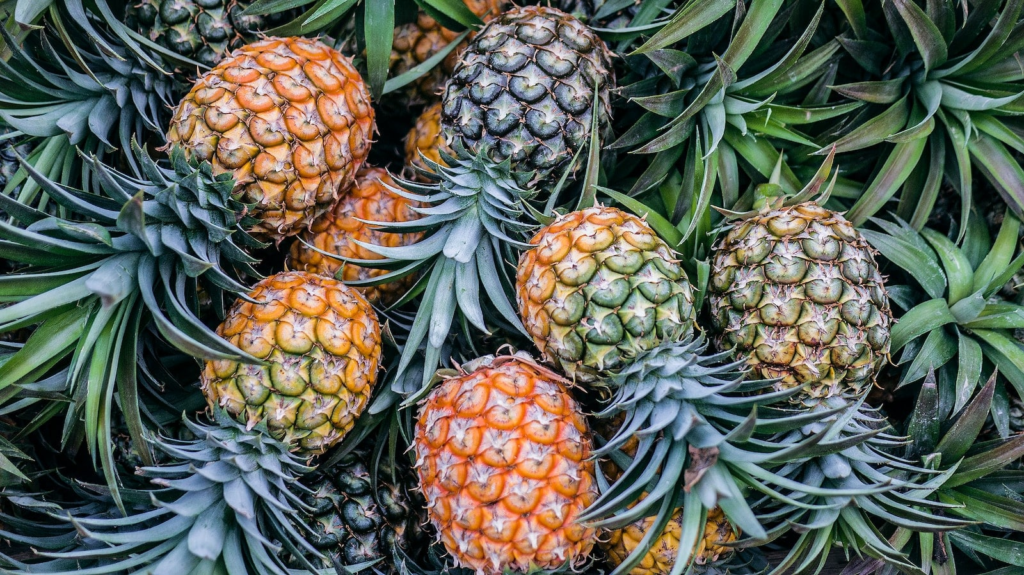
The sunshine-yellow flesh and spiky crown of a pineapple aren’t just visually appealing; they’re a treasure trove of health benefits. This tropical fruit, native to South America, has become a global favourite for its refreshing taste and versatility in dishes. But beyond its deliciousness, pineapple packs a powerful punch of vitamins, minerals, and unique enzymes that can significantly boost your well-being.
This article dives deep into the world of pineapple benefits, exploring its nutritional profile, how it can improve your health, and incorporating it into your diet.
A Tropical Powerhouse: Nutritional Profile of Pineapple
Pineapples are a low-calorie fruit, with a cup (165 grams) containing only 82 calories. However, those calories come packed with essential nutrients:
- Vitamins: Pineapple is a superstar source of vitamin C, with a cup providing over 130% of your daily recommended value. It’s also a good source of vitamins B6 and thiamine.
- Minerals: This fruit boasts a wealth of minerals, including manganese (exceeding 700% of your daily needs!), potassium, copper, and magnesium.
- Fiber: A cup of pineapple offers nearly 3 grams of dietary fibre, crucial for gut health and digestion.
- Bromelain: This unique enzyme, found primarily in the stem and core, is what sets pineapple apart. Bromelain has anti-inflammatory and digestive properties.
These nutrients work synergistically to offer a multitude of health benefits.
Unveiling the Benefits: How Pineapple Can Enhance Your Health

Pineapples aren’t just a tasty treat; they’re a natural source of wellness. Here’s a glimpse into how incorporating pineapple into your diet can benefit you:
- Boosts Immunity: The high vitamin C content in pineapple makes it a champion for immune function. Vitamin C helps your body produce white blood cells, which fight off infections and keep you healthy.
- Improves Digestion: Bromelain, the superstar enzyme in pineapple, breaks down protein molecules, aiding digestion. This can be especially helpful for those with indigestion or feeling sluggish after a heavy meal.
- Reduces Inflammation: Bromelain’s anti-inflammatory properties can be beneficial for various conditions. Studies suggest it may help reduce pain and swelling caused by arthritis, injuries, and even sinusitis.
- Promotes Wound Healing: Bromelain may also accelerate wound healing. Research suggests it might reduce inflammation and improve tissue regeneration after surgery.
- Supports Bone Health: Manganese in pineapple plays a vital role in bone health. It’s essential for the production of collagen, a protein that keeps bones strong and flexible.
- May Reduce Cancer Risk: Studies suggest that the combination of vitamin C, bromelain, and other antioxidants in pineapple might have anti-cancer properties. However, more research is needed in this area.
- Eye Health: Pineapples contain small amounts of beta-carotene, which converts to vitamin A in the body. Vitamin A is essential for maintaining healthy vision and preventing age-related macular degeneration.
- Skincare Benefits: Vitamin C and bromelain in pineapples contribute to healthy skin. Vitamin C promotes collagen production, keeping skin firm and youthful, while bromelain may help reduce inflammation and acne.
- Natural Diuretic: Pineapples are a good source of potassium, a natural diuretic that helps regulate blood pressure and eliminate excess fluids from the body.
- Improves Oral Health: Pineapples contain vitamin C, which helps maintain healthy gums and reduce the risk of gum disease.
Beyond the list, pineapples may also offer benefits for:
- Reducing the risk of blood clots
- Combating nausea
- Boosting energy levels
- Promoting stress relief
It’s important to note that most of these benefits are based on promising research, and further studies are needed to confirm the exact effects.
Adding the Golden Touch: How to Include Pineapple in Your Diet
With its versatility and delicious flavour, incorporating pineapple into your diet is easy and enjoyable. Here are some ideas:
- Enjoy it fresh: Cut pineapple into cubes, slices, or sticks for a refreshing snack.
- Blend it up: Add chopped pineapple to smoothies or yoghurt parfaits for a tropical twist.
- Get grilling: Grilled pineapple adds a sweet and smoky flavour to savoury dishes like chicken or fish.
- Bake it in Pineapple chunks or crushed pineapple can add moisture and sweetness to cakes, muffins, or bread.
- Top it off: Diced pineapple adds a delightful touch to salads, pizzas, or stir-fries.
- Juice it up: Freshly squeezed pineapple juice is a delicious and hydrating beverage.
FAQs
Q: What are the top health benefits of pineapple?
A: Pineapples are champions of vitamin C and manganese, supporting immunity and a healthy metabolism. They also boast:
- Digestive enzymes: Bromelain in pineapple helps break down protein, aiding digestion.
- Anti-inflammatory properties: Bromelain may also reduce inflammation, potentially easing pain from injuries or arthritis.
- Immune system boost: Vitamin C in pineapple is a key player in keeping your immune system strong.
Q: Can pineapple help with weight loss?
A: While pineapple isn’t a magic weight-loss bullet, it can be a helpful addition to a balanced diet. It’s low in calories and high in water, making you feel fuller for longer [1].
Q: Does pineapple improve skin health?
A: Vitamin C in pineapple contributes to collagen production, which is important for maintaining skin health and elasticity [2].
Q: How to incorporate pineapple into your diet?
A: The beauty of pineapple is its versatility! Enjoy it fresh, grilled, juiced, or even add it to smoothies, salads, and yoghurt parfaits.
Q: Are there any downsides to eating pineapple?
A: In moderation, pineapple is generally safe. However, large amounts might irritate your mouth or throat due to bromelain. If you’re taking blood thinners, consult your doctor before consuming large quantities of pineapple, as it may interact with these medications [2].
Q: Can diabetics eat pineapple?
A: Pineapples do contain sugar. While they can be part of a diabetic diet, it’s important to monitor your intake and portion sizes. Talk to your doctor or a registered dietitian for personalized advice.
Bonus: Q: Does pineapple tenderize meat?
A: Yes! The bromelain in pineapple breaks down protein fibres, making meat more tender. Marinate your meat with pineapple for a juicy and flavorful result.
Remember: Always consult a healthcare professional before making significant changes to your diet, especially if you have underlying health conditions.
To read more, Click here
